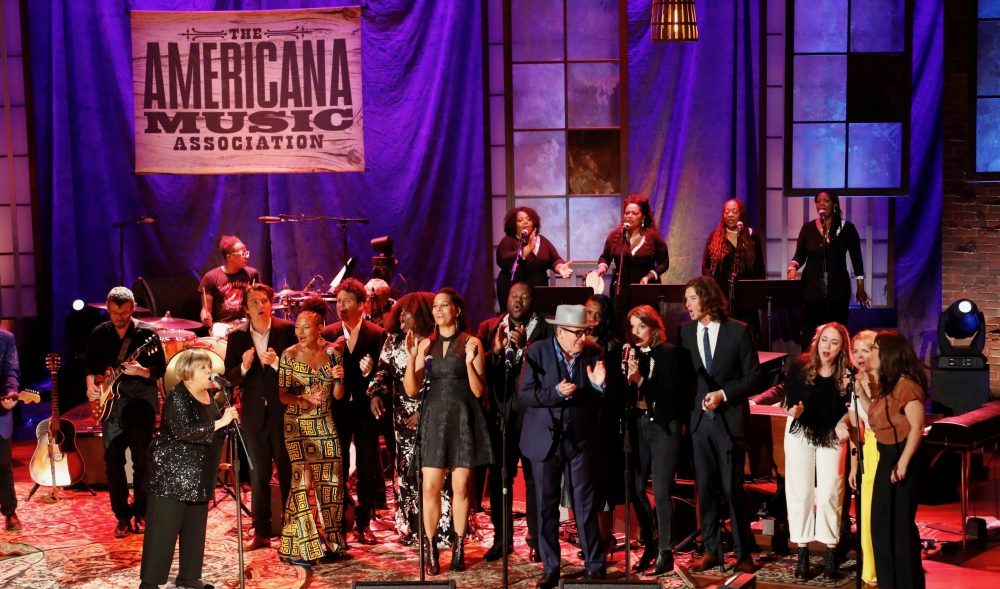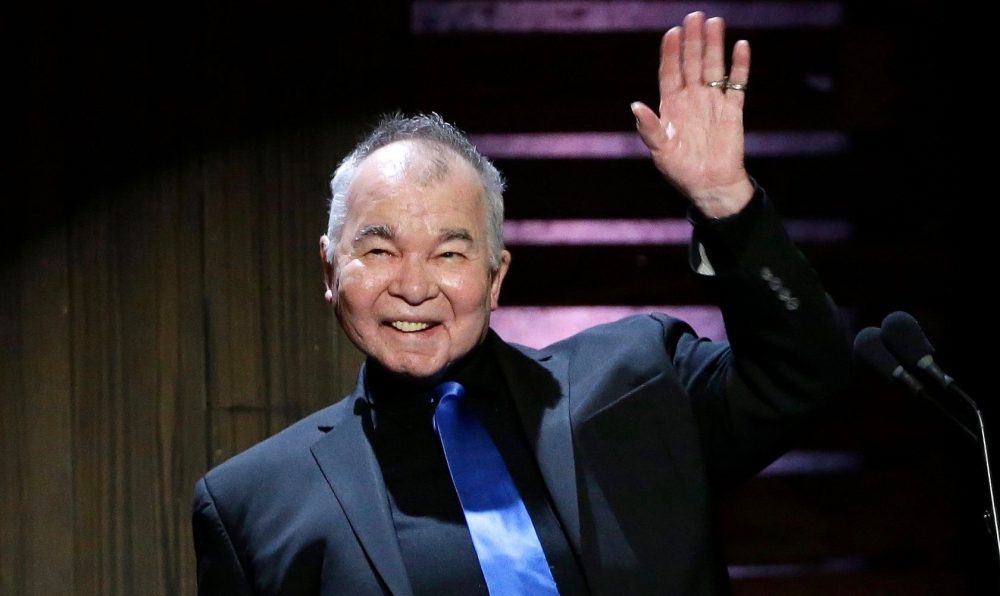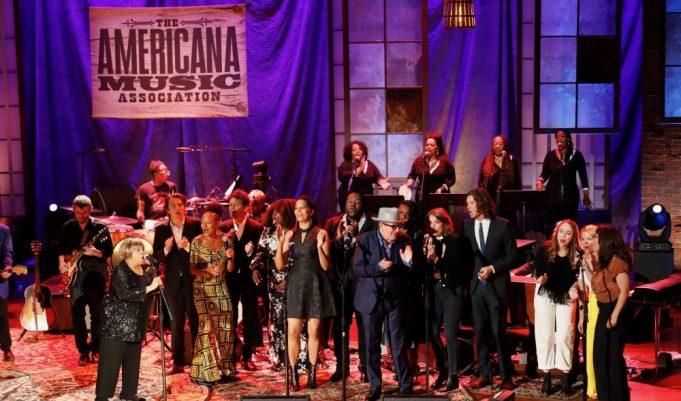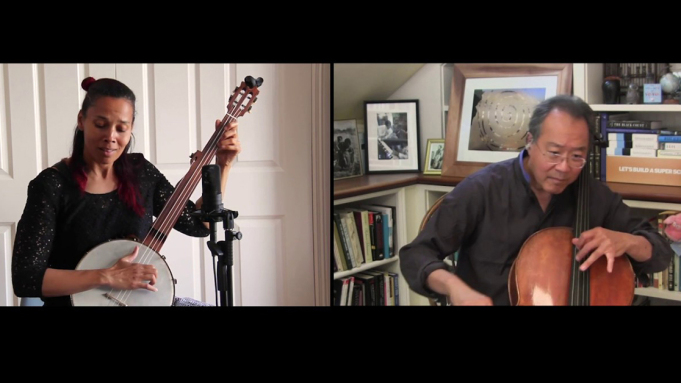The storm may have been too strong for most music-biz awards events or conferences to go on in anything resembling their traditional form this year, but the Americana Music Association likes to think of itself as, well, more rooted than that. The org that celebrates the rootsier forms of contemporary music has had a slew of more uplifting announcements in recent weeks, since announcing that the annual AmericanaFest gathering in Nashville was, like nearly all other live events, toast.
The Americana Honors & Awards will take place at the Ryman Auditorium Sept, 16, as planned — with or without a TBD live audience — with a slate of nominees that includes Brandi Carlile, Brittany Howard, Nathaniel Rateliff, Tanya Tucker, Yola, Drive-By Truckers and the late John Prine. Moreover, the sorts of panels, conversations and live showcases that would have taken place in hotels and clubs across Nashville that week will now be found online in That Sept. 16-18 gathering of the roots troops may be thought of by its remote attendees as a virtual AmericanaFest in everything but name, though organizers wanted to give it its own identity.
A fully produced, performance-filled, live awards show and what may be the year’s most ambitious virtual music conference may seem like a lot to bite off and chew when so many likeminded orgs have determined to coast into a more event-conducive 2021. Jed Hilly, executive director of the Americana Music Association, sat for an open-ended conversation to discuss how it was determined that, live or online, all these shows must go on. Hilly also discussed the formation of the new Americana Music Association Foundation, which has an inaugural board of directors that includes Carlile, T Bone Burnett, Rhiannon Giddens and Jackson Browne, all of whom will be participating in the foundation-produced Thriving Roots programming, as will Mavis Staples, John Leventhal and Rosanne Cash.
VARIETY: Most music organizations that put on awards and conferences are just canceling the conferences and dumping the awards onlne. You’re sticking with a live awards show, and you’ve announced a virtual conference with a lot of things promised —50 panels, 40 special events.
HILLY: I know, we’re a little crazy.
Talk about the Americana Honors & Awards. It’s still set for the Ryman Auditorium on Sept. 16, even though all other festival events in person that week have been called off. You can still pull that off?
We’re planning on it. The Ryman the one venue that we think we might be able to do something in, and whether there’s 40 people in the room, like Sturgill Simpson did this month [for a livestream], or 400 people in the room, if we’re social-distanced by six feet, or 2,300 people capacity in the room, we still don’t know. But our goal is to produce the awards show for these artists that we love and community that we love. Our heads are very focused on it.
Some people were like, “Oh dude, do the [awards] event virtually.” How do I do that event virtually? It’s so rich in spirit in the Ryman — we don’t even need mics in that room. How do I move from that to [remote appearances]? You know, I love all the living room performances we’ve gotten to see, but that’s not what that show is. That show has a life of its own. I’m in touch with Buddy (Miller, the annual band leader). We may take the curtain down and put a bunch of candles on the stage. I have no idea, but we’re going to do whatever it takes to make it happen. It’s the Ryman. We’ve been there for 15 years, and we’re going to be there again. Emmylou Harris calls it the shining star of Nashville and music everywhere. From her lips to God’s ears — if anybody can speak to him, it’s her.
Let’s look at how your expectations changed over the last few months, and how you got to the point of announcing a virtual music conference. What was it like figuring out how to proceed as the goal posts for anything live getting pushed further away all the time?
When I saw things [scheduled for] March, April, May and June closing down, it occurred to me that AmericanaFest potentially would be the reopening party. And so I was holding out, like, “The greatest scientists in the world are going to figure this out, and we’re actually going to be able to do it. We’re going to be the first music business conference. More people will come because South By (Southwest) couldn’t happen. Who knows?” We were up 37% on February 6 from last year — huge increase. On February 6, I’m looking at this as our breakout year; this is when everybody gets raises. And then we didn’t had a purchase since March 6… until now. We got our PPP loan that forgave us a couple months of not having to worry about where more money was.
Were you on the hook for a lot of money invested?
We’re effectively breaking our contract at the Westin, which they could have legally told us we still needed to pay $150,000. That’s what we were on the hook for. But literally today they wrote us a letter that formally said, “Okay, we’re relieving you.” We are confirmed with them for September of 2021. If we have 2300 people coming, from out of town, we would tell them to stay at the Westin. It’s great that our partners are being very understanding, because that’s the type of thing that can shutter an organization.
As time wore on, what hurt the most was… Our week is an important week for the community, and an important part of the community is all of the venues that we use. When I started, there were five venues in total and 56 showcases. Last year there were 23 nighttime venues, 320 official showcases and another literally 40 backyards, restaurants, clothing stores, and warehouse spaces that had ancillary events, cocktail parties or luncheons that were officially sanctioned events. With the exception of the Ryman, all of the club venue owners for the showcases give us their room for free, in part because we’ve grown up here, and in part because we now get enough people that the Cannery Ballroom tells us that it’s their best week of selling beer. And so it was breaking my heart, as I was holding out as long as I did, because I can’t even get my arms around what this means for the venues and the artists who have no place to play.
And we realized that we had to do something, and that there was no way we could just replace AmericanaFest online. AmericanaFest is like a family reunion. We are in the business of people gathering. It is heartbreaking to not bring everybody together. But we’re not going to be defeated. We hope to put some optimism out there.
So you created an online conference to replace AmericanaFest, but you wanted to brand it differently, as Thriving Roots?
About six weeks ago, it was like the light bulb went off: “Okay, we’re going to do something different. Let’s create an opportunity for the community to come together online, to do a lot of what we normally would do in the hotel in the ballrooms and in the conference rooms, but let’s make it different. Let’s make it… Americana meets MasterClass.” Jackson Browne’s agreed to do something. Mavis Staples has agreed to be part of it. Rhiannon has agreed to do something. Rosanne is going to do something. That’s the beginning of the high level acts that we’re having, and it’s an opportunity for these artists in our community to talk to the community, all in one place. It’s like a class, in that with your $99 conference registration, you get to keep it for a year, and if you missed Mavis’ conversation or panel because you were watching T Bone’s, you can go back and watch Mavis’ later tonight, tomorrow, next month or in 10 months.
We’re approaching artists who we think people would want to hear from, not just from the music education perspective, but also from the heart… Mavis is going crazy not being out on the road. God bless her. I’m not the only one who wants to hear from them.
The meat of it is going to be conversation. We will be addressing the issues of the day. There’s going to be three or four different panel rooms online (at a time). So when you go to the Thriving Roots page and get your registration, you’ll sign in and see your schedule, on this platform that looks just like our (festival) app. And we’re giving the labels an opportunity to promote their priority acts, and I imagine most of it will be their developing artists. so they’ll have an opportunity to put this next generation of artists in there.
There’ll be performances. There’ll be an opportunity for a sponsor who might be a beverage company to find an artist that they might’ve worked with in some sort of sponsorship realm that lives in our community, and maybe they can do a 15- or 20-minute mixology class about making a drink with that particular beverage. We want to make it fun and to bring in the artists to be a part of those types of things, too. I’ll put it out there: if Willie wants to do something to demonstrate Willie’s Reserve, we’re more than willing to work with them!
I’m really excited about it. But I mean, it’s hard. I have friends who’ve died, I have friends who’ve lost their jobs, and almost all of my friends are living in this place of uncertainty, not knowing if they’re going to die or not knowing if they’re going to lose their jobs. I don’t mean to be a cliché and to state the obvious, but it’s an unprecedented time. And what we hope and what I hope Thriving Roots is is a concentrated effort to focus on this community.

Performers, inclding Mavis Staples, foreground left, and Elvis Costello, center right, fill the stage as they sing ‘I’ll Fly Away” for the finale at the Americana Honors & Awards show, in Nashville Sept. 2019 Wade Payne/AP/Shutterstock
Can you talk about the creation of the Foundation and why it was something to create that as something that has an identity distinct from everything else you do?
It does and it doesn’t. On the one hand, it doesn’t, because to me, what the Foundation represents is getting back to our roots, for lack of a better phrase. Basically it’s creating a completely new entity whose focus is not to produce a music festival. That’s not to say that that’s all the Americana Music Association does, but that is the primary focus of the Americana Music Association is to produce AmericanaFest and to bring people together.
When I started, we had a mission statement which talked about how the organization was intended to support the business that was Americana by coordinating and communicating, and creating an infrastructure for labels and publicists and agents and that kind of a thing. It was very sort of business-centric. So when we started the Association, we didn’t start to become a music festival.
But we did start it to advocate the authentic voice of American roots music, and we’ve tried our best to do that with the showcase concept and with the awards show. The conference that we’ve done has been where we’ve tried to educate, having Rhiannon talk with John Jeremiah Sullivan about the history of the banjo and the African American instrument that came to America, and about Frank Johnson, the great band leader of the early and mid-19th century. That’s where we’ve done educational stuff.
This foundation in many ways goes back to the very beginning of why the association was actually created. I don’t know that we lost sight of what that original mission was. But I know in the 2008 recession and 2009, I remember sitting in boardrooms and saying, “This is all about driving traffic to September, and to attend our event, because if we don’t, we won’t exist as an association.” So the festival was the mother of necessity. We were hopeful that we wouldn’t be in these difficult times when we launched the Foundation, but at the same time, it gives me hope: What better time to launch the Foundation? Because the Foundation is about digging into that inspiration that we love. And that to me is as important as anything. It’s like an institutional guard to make sure that we always look at our past and how it moves to the future.
So you would say the Foundation is specifically commemorative in terms of about linking the past and the present, as opposed to having activities that are just focused on today’s music?
Yeah — while we have legends as part of AmericanaFest, by and large it a discovery event. I would argue that you could have gone to any one of those 20-plus venues last year and not known the five bands that are playing every hour on the hour from 7 to 1 in the morning, and had one of of them knock your socks off. You will find your new favorite act at AmericanaFest. It’s very much a discovery event, which I think is at the core of any music-loving fan.
This is not necessarily a discovery, but the Foundation is not a discovery, but it might be a rediscovery forum. It’s to chronicle and archive the artform that is Americana, which is a byproduct of the blues and traditional country and gospel and soul and rock ‘n’ roll, and more. The Foundation gives us a little more flexibility to dig into how this all happened, which we’ve done within the structure of the music business conference. We plan to reach out to universities. There are opportunities with the resources that we have and with the artists who are passionate about this. With T Bone and Jackson and Rhiannon and Brandi on our Foundation board, I think any university in the country would want to hear what’s important to them. There could be a lecture series. We’re also looking into archive stuff, things that may be lost, in the spirit of (Alan) Lomax, in the spirit of great field recordings, There’s a lot of stuff out there we don’t know about, from the Norte/Tejano scene to the folk scene, all the way back to the lullabies.
And, you know, Bonnie Raitt has been an active participant and member and even board member, and Bonnie wants to remember the artform that is the blues, which inspired her to play the slide guitar. That’s cool, deep stuff that we can further explore.
How do the foundation and the Americana Music Association on the most basic charitable level?
Do you know the difference between a C3 and a C6? It took me a while to figure it out. A C3 is a charitable organization, which means that if you have a lot of money and you think we do good work and want to write us a check and want a tax write-off, you can do that. You can’t do that for the Americana Music Association, which is a trade association. The Foundation is an educational forum.
The Thriving Roots conference is a good chance to tell people about the Foundation. But since it is going to replace AmericanaFest in the hearts of the usual attendees, as well as on the calendar, was there any thought of just calling it “AmericanaFest: At Home Edition”?
It was a big step to say, is this virtual AmericanaFest? We had lots of conversations about it. We had board meetings where we laid out why Thriving Roots is not AmericanaFest, that we can’t duplicate that. It would sort of be like trying to duplicate the awards show at the Ryman (online). [There was a thought] like, “Oh, but AmericanaFest is the brand!” But if it’s the brand, we’re not delivering the brand. So that was part of the logic of Thriving Roots. Maybe it was a mistake. We’ll find out! But we do have such an incredible community, I think people will be there to support us.
As far as the balance you were just talking about between discovery and legacy, the Honors show has always been about both, because obviously you have all the lifetime achievement awards to go along with the awards for current artists. Is that something you can do this year? For the current awards, you have a lot of nominees who live in Nashville, but that may not be nearly as much the case for some of the veterans you’d put up as lifetime honorees. Is that something that you might have to put off for a year?
You ask a good question. And I’ve fortunately avoided every other journalist who might’ve possibly asked me that question. So you’re the first to get the answer: I don’t know. You are correct, we’re trying to figure out what that looks like. I’m not going to put anyone in harm’s way, whether that’s in a nightclub or on an airplane. We are just in the process of sort of looking at who the (current) nominees are, and who can make it, since not everybody lives here (in Nashville). And similarly, we’re looking at, how will we approach the lifetime achievement awards? It will have to be different. We will address it and what that looks like, but I’m not going to be so cavalier as to say, yeah, come hell or high water, we’re doing that. And it won’t just be my decision; it will be a collaborative decision with the producers and board members. Everybody has been in agreement — we’ll cross that bridge when we come to it. But we will be back and we’ll still be doing something in September.
Some of us always wondered why the Americana Awards would only have four nominees per category, and recognize fewer people. Why did you up it to five this year?
We just wanted to give more people more chances. It really was that simple. It used to be five a number of years ago, and we lowered it to four. Part of the reason for that is we always gave everybody (who was nominated) a chance to play on the show, and people’s bottoms were hurting sitting in the pews of the Ryman for more than three and a half hours. We never said no. But we thought this was a good year to add a fifth. And I’m proud of the community and membership for putting those names forward. I can think of at least three to nine additional artists that are worthy to have been in any one of those categories, but that’s not for me to judge. It’s a great crop. I’m definitely proud to represent the organization and the artists that are featured on the list.

John Prine at the
Americana Music Association Honors and Awards Show, Nashville, USA – 21 Sep 2016 Mark Zaleski/AP/Shutterstock
Finally, John Prine, having been sort of the patron saints of all things Americana, will be a deeply felt loss at this year’s awards show. The last time some of us saw him was performing Willie Nelson songs at an Americana Association-hosted tribute to Willie in L.A. the night before the Grammys, so it feels like he was just right before our eyes. Is it safe to assume he’ll figure into the awards show somehow?
Yeah. I still have a hard time talking about John. So forgive me if I’m brief, but… John will be remembered and will be the wind in our sail for years to come. He was good to us. He was good to everyone.

